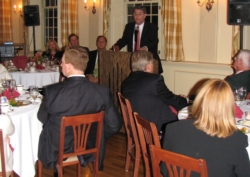Weigel speaks of Pope Benedict XVI at monthly Legatus meeting
WESTON -- Pope Benedict XVI has been placed in the role of a star basketball player seeking to shoot the game-winning basket with seconds on the clock, said George Weigel at the monthly Legatus meeting on Sept. 20.
Rather than playing for an NBA title, the Bavarian-born expositor of the Catholic faith is attempting to contend to save Europe, currently committing demographic suicide. The only thing that can save Europe is for its people to reencounter their Christian roots, Weigel said.
Speaking on the theme “Pope Benedict XVI; After Two Years,” Weigel addressed the Boston chapter of Legatus at the Weston Golf Club. Legatus is a membership organization for Catholic business leaders and their spouses. The Boston chapter typically meets on the third Thursday of each month. The evening includes a discussion on Christ in the workplace, Mass, dinner and a speaker.
Weigel, an author and syndicated columnist, has spoken to the Boston chapter three times in the last six years. He is a native of Baltimore and graduate of St. Mary Seminary College and the University of St. Michael College in Toronto. His best-selling book is “Witness to Hope,” a biography of Pope John Paul II.
Working on John Paul’s biography brought Weigel close to Cardinal Joseph Ratzinger, whom he met in 1988. Weigel said that when he discovered that his friend had been elected by the College of Cardinals, one of his first reactions was “desperate sadness.”
“One doesn’t like to see people one admires, considers friends, have virtually impossible jobs thrust upon them, particularly when they’re 78 years old and looking forward to retirement,” he said.
However, Weigel was also glad to see the cardinal “free to be himself.” In his service to Pope John Paul, Cardinal Ratzinger had subordinated his personality and his will, even having his three requests for retirement denied.
Weigel said he thought, “Finally the world is going to see the Joseph Ratzinger I know. Finally the world is going to meet this shy, charming, lucidly intelligent, brilliant expositor of the Catholic faith on his own terms.”
In the past two years, Pope Benedict has brought several themes to the forefront of his pontificate. He has communicated to the Catholic faithful that the Christian God is not remote. Rather he is the God with a human face. He has said that the Church is most itself when celebrating the Eucharist -- through the liturgy or adoration.
But perhaps his most important statement was given at Regensburg University in Germany when he spoke about the central problem of world civilization at the beginning of the 21st century. The problem has two sides -- the first is irrational faith and the second is loss of faith in reason, Weigel said.
Irrational faith can allow people to believe that God wills them to “fly a 767 into the World Trade Center,” while lack of faith in reason leaves society more vulnerable to those kinds of attacks, he said.
Western civilization is like a three-legged stool, supported by Biblical faith, confidence in reason and Roman law. Those three themes can be summed up in three cities -- Jerusalem, Athens and Rome, respectively. Currently, the Jerusalem leg has been kicked out and the other two legs are wobbly, Weigel expounded.
Europeans are used to the state solving problems, but the fact is that the governments of Europe will not be able to pay for healthcare and pensions in the future because their people are not creating a future generation, he said.
“The only answer to this is in fact conversion -- the re-evangelization of Europe,” he said.
In order to create a future generation, people need to understand that the command “be fruitful and multiply” applies to them, he said.
Weigel added that there are many signs of hope in the current pontificate. While Pope Benedict has been largely ignored by the American media since their caricatures of him as a “German rottweiler” were found to be untrue, he has drawn large crowds to his Wednesday audiences. The crowds number 40,000-50,000, larger than the crowds that came to Pope John Paul’s Wednesday audiences.
Some of the growth can be explained by the daily visit of 20,000 pilgrims to Pope John Paul’s tomb. But people are also coming “to get fed” as they did when they visited Pope John Paul’s audiences, he said.
In addition, Weigel said that Pope Benedict’s upcoming visit to the United Nations in New York will remind people in the United States, particularly the media, that he is “worth paying attention to.”
Scot Landry, president of the Boston chapter of Legatus, said of Weigel’s comments, “George did a tremendous job of outlining the roots that underlie the leadership that Pope Benedict XVI is providing to the Church.”
Weigel is a popular speaker who last spoke to the chapter four years ago, he added.
Landry is also Secretary for Advancement and Chief Development Officer of the Archdiocese of Boston.
Andreas Widmer, the Boston Legatus program chair and former Swiss Guard, called Weigel one of the “foremost commentators of all things Catholic in America.”



















